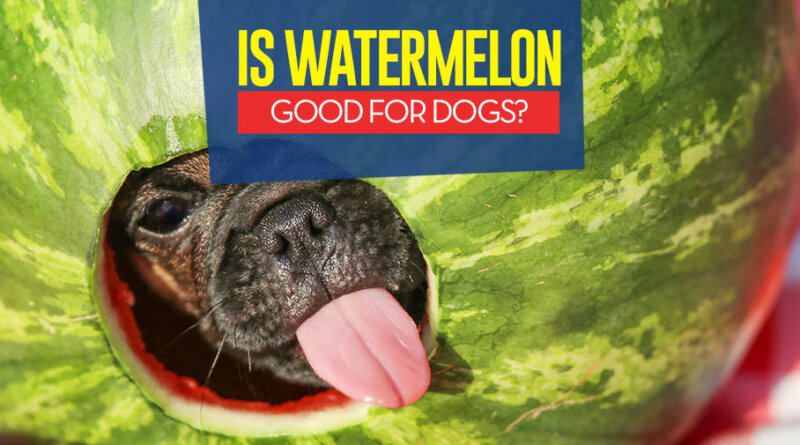Watermelons for Dogs 101: Can Dogs Eat Watermelons?
[ad_1]
We all love fresh fruit in the summer that is sweet and refreshing, and watermelon is right at there at the top.
Human food like this is not only
But can dogs eat watermelon?
Are there health benefits of watermelons for dogs, and are there any side effects from dogs eating watermelon?
Let’s take a look.
If you’ve been wondering if you can give watermelon to your dog, the answer is YES – dogs can eat watermelons, and this fruit is not toxic to dogs.
It’s the perfect sweet treat that doubles as a hydrating snack.
However, you must always remove watermelon seeds from it and only feed moderate amounts to dogs.
Watermelon may actually have several health benefits for dogs, but this fruit is also not without its caveats.
It’s important to practice caution and feed in small amounts and only as an occasional treat.
Here’s what you must know about it.
The Bottom Line: Watermelon is safe for dogs to eat.
Dogs enjoy watermelon because it is tasty, refreshing and very sweet.
Feed your dog watermelon in moderation to avoid an upset stomach.
Make sure they are seedless watermelons. The seeds can cause an intestinal blockage.
When you feed them, serve them in bite-sized chunks to your dog.
And we will talk about how much watermelon they can eat to avoid overfeeding them later and a few guidelines to follow.
ALSO READ: Can Dogs Eat Cherries?
What are watermelons?
A watermelon, also known as Citrullus lanatus, is a type of large water-dense fruit (92% water and 8% melon) that originated in South Africa.
It has a smooth, green striped exterior rind and a sweet, juicy pink interior.
Due to its high water content, it’s very refreshing and often eaten cold during warm summer months.
Watermelons come in seeded and seedless varieties.
This is what a fresh watermelon looks like:

Watermelons provide several vitamins and nutrients.
They’re a great source of two powerful compounds called lycopene and citrulline. Watermelons are low in calories.
Compared to other fruits, watermelons are actually very low in antioxidants (1).
On the bright side, they’re a good source of a few other nutrients that many fruits don’t have (2).
Can Dogs Eat Watermelon? Everything You Need To Know
So can dogs eat watermelon just as humans can?
Yes, absolutely – watermelon is totally safe for dogs to consume, provided you have removed the seeds and only feed it to your dog in moderation and as an occasional treat.
Not only that, but this fruit provides them with some essential nutrients and health benefits, all of which we discuss below.
While not that high in antioxidants, watermelons still pack a few good nutrients:
- Vitamin A (beta-carotene)
- Vitamin C
- Vitamin B5
- Potassium
- Copper
- Citrulline
- Lycopene
While many of the above nutrients are yet to be studied with dogs, in humans it has been shown that citrulline in watermelons may lower blood pressure (3) and improve the health of most vital organs, including liver, kidneys and lungs (4, 5, 6).
Furthermore, watermelons are actually a better source of lycopene than tomatoes are, meaning it helps the body more effectively absorb and form Vitamin A (7, 8, 9).
Other than that, studies in humans have shown the following health benefits from consuming watermelons, all of which are associated with the above nutrients:
- It may reduce insulin resistance (10, 11)
- It lowers blood pressure (12, 13)
- It may reduce muscle soreness (14)
With the above in mind, it’s safe to assume that some of the benefits can also stretch to canines, and watermelons for dogs may be another healthy food addition you can make to improve your dog’s health.
Below are the potential health benefits from feeding watermelon to dogs.
RELATED: Can Dogs Eat Bananas?

5 Benefits of Watermelon for Dogs
Dogs can eat watermelon in moderate amounts and reap some of the health benefits it provides.
However, very few of these have been supported by studies and are mostly based on human research.
Nevertheless, as long as watermelon for dogs is safe to consume, it’s likely that feeding it on occasion to your Fido will only benefit him.
1. Beta-carotene in watermelons may help improve eye health.
The Vitamin A (beta-carotene) found in watermelons may help promote and maintain your dog’s eyesight.
Even more so, because watermelon contains a large amount of citrulline, it improves Vitamin A absorption and allows the body to form beta-carotene more easily.
2. Vitamin C in watermelons provides several health benefits for dogs.
Vitamin C (Ascorbic acid) in watermelon is a vital nutrient which is known to strengthen a dog’s immune system and help canines combat degenerative conditions.
Vitamin C may also improve cartilage and collagen synthesis in dogs.
3. Watermelons contain potassium, a vital mineral for body function.
Watermelons have loads of potassium which improves blood vessel function, replaces lost electrolytes in a dog’s body, and strengthens dog’s muscle development.
4. The magnesium in watermelon is critical to growth and production.
There are small amounts of magnesium found in watermelon. Magnesium helps the dog’s body to produce proteins, develop healthy bone growth, and absorb necessary vitamins.
5. Watermelons are an excellent source of hydration.
Watermelon is a very water-dense fruit, making it a perfect snack to keep your dog hydrated on a hot summer day, similar to why you would give cucumbers to dogs.
This is particularly applicable to active dogs that expend a lot of energy and dehydrate themselves quickly while forgetting to drink plenty of water.

“So, can I give my dog watermelon?”
Yes, dogs can eat watermelons without any problems as long as you give it in moderate amounts and as an occasional treat rather than turn it into a main dietary component.
Just like giving cantaloupe to dogs, too much of this sweet fruit is not good.
But as long as the dog has an otherwise healthy diet where a sufficient amount of protein, fat and carbohydrates are provided, watermelons for dogs may be a healthy addition.
That said, there are a few safety precautions of feeding watermelon to dogs that you must keep in mind, and I’ll cover those below.
What about watermelon juice for dogs?
Fresh, natural watermelon juice is just grounded up watermelon. This means that watermelon juice for dogs is also safe to consume, provided there are no additives.
2 Potential Side Effects of Watermelons for Dogs

We’ve established that feeding watermelons for dogs can provide several health benefits and a watermelon is a totally safe treat for canines.
However, watermelon seeds are dangerous to dogs and overfeeding dogs on watermelon can also pose certain risks.
Here’s what you need to keep in mind:
1. Too much watermelon can cause stomach upset in dogs.
If fed in excess, watermelon can cause issues in their digestive system, including vomiting, diarrhea, and constipation.
Because of its high content of natural sugar and several nutrients, too much of this good thing is bad for dogs.
Treats like this should only make up 10% of your dog’s diet and daily calories.
2. Large pieces of watermelon can cause choking hazards.
Even though watermelon is easy for dogs to eat, some large watermelon chunks can get caught in a dog’s throat, as dogs are normally more likely to swallow than chew.
It’s advisable that watermelon should be cut up into smaller pieces before feeding it to dogs to prevent any potential choking hazards.
RELATED: Can Dogs Eat Macadamia Nuts?
More on Watermelons for Dogs: 5 Safety Precautions

While it’s safe to feed watermelon to dogs, and there are no side effects that we currently know of (provided you feed it moderation and as an occasional treat), there are certain safety precautions that all dog owners must be aware of.
The two main dangers of watermelon for dogs are its seeds and watermelon rinds. Dogs still love the taste of either, or they may accidentally ingest these. So here’s what you need to keep in mind:
Watermelon rinds are dangerous for dogs.
The fruit of a watermelon itself may be fine for dogs to eat, but its exterior is not.
Watermelon rind does not provide the nutritional value to dogs that it does to humans, and because of its potential dangers to dogs, it’s not worth risking your dog’s health.
Here are two reasons why the rind should be avoided at all costs:
1. Watermelon rind is pure roughage and causes intestinal distress in dogs.
It is extremely difficult for dogs to digest. It may cause gastrointestinal problems, resulting in diarrhea, constipation, bloating, and vomiting.
It also poses a choking hazard as well as potential intestinal blockage if given in large pieces.
2. Watermelon rind can do serious damage to your dog’s teeth.
Because watermelon rind is so tough to chew, a dog may persist at working at the rind which can cause damage to the teeth and gums.
Even though dog’s teeth are generally tough and able to handle harder things, it’s not worth the risk.
Watermelon seeds are dangerous to dogs as well.
Another potentially dangerous aspect of feeding watermelon for dogs is its seeds.
Why are watermelon seeds so problematic for dogs? There are several reasons:
3. Watermelon seeds can cause intestinal blockage.
The seeds are too small for a dog to choke on, but enough of them can cause a blockage in the intestines, and watermelons have a lot of seeds. Before you give your dog watermelon, all seeds need to be removed from the fruit.
4. Watermelon seeds are hard to digest and may cause stomach upset.
Just like with the seeds of most other fruits and vegetables, dogs who ingest too many of these seeds can suffer from an upset stomach, including vomiting, stomach pain, and diarrhea.
5. Seedless watermelons still have seeds, making them dangerous.
Don’t be fooled by the term “seedless watermelon.” They may not have the larger black seeds and will have smaller amounts of seeds in general, but they still have those pesky small white seeds that can also cause intestinal upset and blockages in dogs.
Summary: Can Dogs Eat Watermelon?
In conclusion, dogs can eat watermelons, and watermelon is not toxic to dogs.
As long as you give your dog watermelon as an occasional treat and in moderation, there are even certain health benefits that your pet will reap from consuming it.
Be sure to contact a veterinarian if your dog has consumed too much watermelon or if you know that your dog has ingested watermelon rinds or seeds.
References
READ NEXT: Turkey and Vegetable Homemade Dog Food Recipe
[ad_2]
Source link




